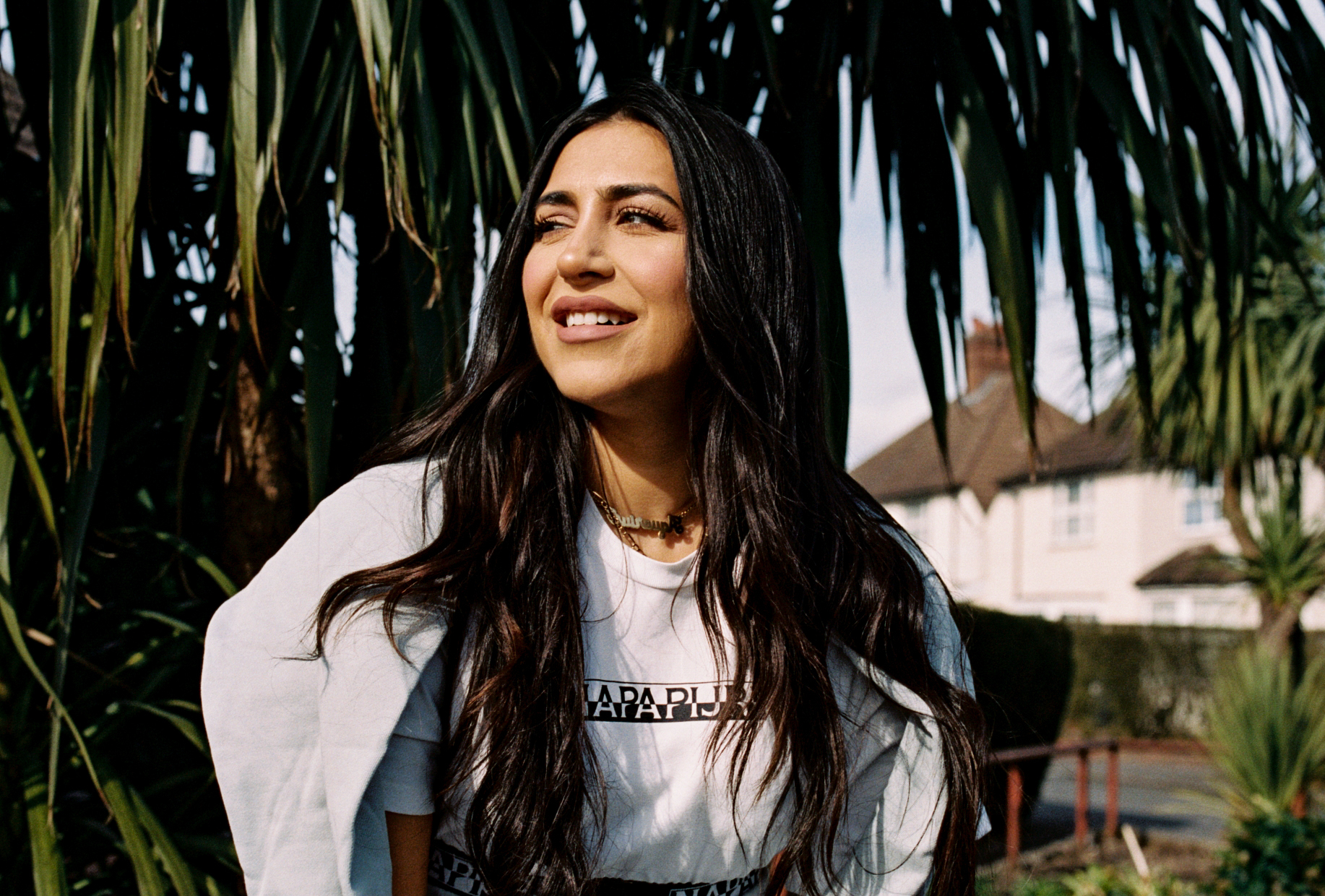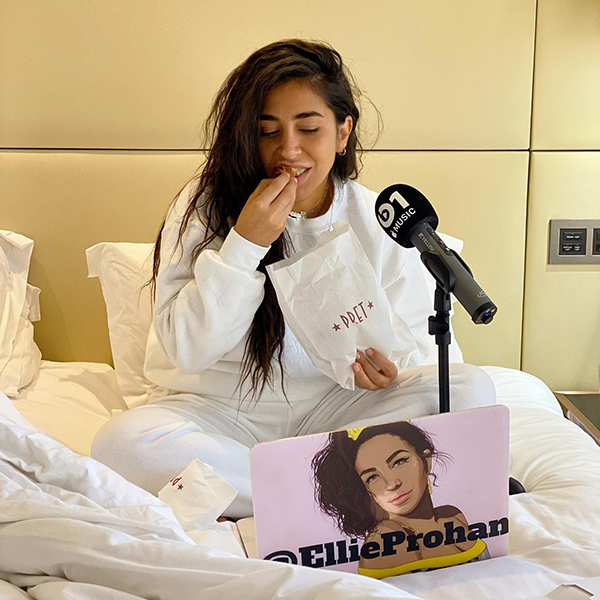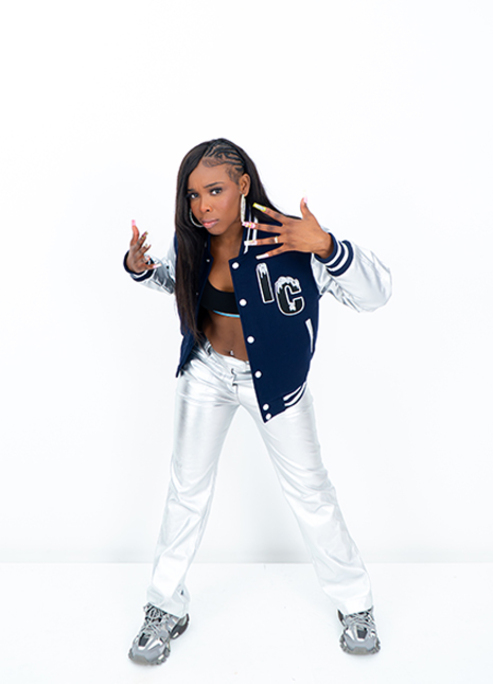
“I have my own battle.” In An Honest Conversation With DJ Ellie Prohan
She talks to us about white male privilege and her potential conversation with Boris Johnson.
We met up with Ellie on the last day of Pride Month and there’s nobody else who would embody the feeling of being proud better than her. She’s direct, honest, truthful, unapologetic, confident - cause she has the perfect right to be. As a charismatic, unstoppable, queer and Middle Eastern DJ, radio host, TV presenter, and organizer of events, she is a truly inspiring persona, full of energy, always ready to fight for other people.
Our conversation also followed a few successful matches of the England team during the Euro Championship. That’s why, together, we reflected upon differences between the sport and music industry and wondered whether the latter suffers because of white male privilege.
Thankfully though, Ellie also returned to the scene. Her Carnival Sound Freedom Rooftop Party took place on 19th July. Stay tuned for more!
Happy Pride, we made it on the last day!
I know! I’m so happy we’ve done that because obviously, it would have been such a shame not to celebrate together in this exact month.
Exactly. On the occasion of the last day of Pride then, how was this Pride different than any other one before? What are you particularly proud of this year?
It’s a difficult one because I feel like every single Pride, I travel back through my journey. I think of all Prides that I’ve missed. So, with every Pride that goes by now, I become more grateful that I’m living my authentic self and I’m able to be happy, have my freedom, and love who I want. That’s why every Pride gets better and better, with everyone else wanting to join in. This year we had so many incredible moments like my Engayged Playlist, being able to bring eight queer artists, and having Gay Times behind it to support us. Small things like that are actually huge in a grand scheme. I think that everybody is becoming more and more respectful of the celebration of Pride. It’s such a shame we don’t have the parade this year because actually, I think it would have been the biggest and the best.
I completely agree. That’s why this Pride feels so different. We can’t march on the streets and express it.
Exactly.
But there are other modes of doing so like your Engayged playlist. Its title seems particularly interesting to me because it made me wonder what does ‘queer’ or ‘gay’ music mean, after all. You know better than anyone else how it feels to fall a victim to labels. As you mention, you often get told that you ‘don’t look gay.’ Do you feel that with labels like ‘gay music,’ you reproduce them sometimes as well, although clearly, you don’t like them?
100%, easily. I think if people were to see my face on the Gay Times playlist, they would think, ‘What is Ellie doing here? Ellie plays drill rap.’ I think people expect that because I’m gay and I’m in the music industry, I shouldn’t be playing the kind of music that I do. I don’t even wanna stereotype back. A lot of the industry that I’m in is still very much closed to the gay scene. There are loads of incredible gay artists who wouldn’t necessarily push to be super open about belonging to the LGBTQ+ community. At the same time though, we know that they’re there. Everyone is on this difficult journey. We don’t want to be out of the scene, we want to be the scene. We don’t want to separate just because we’re gay and we’re assumed to like a certain kind of music. I love drill and rap. I even had the interview the other day with Mr. Strange who’s the first-ever openly gay drill artist. Talking to him was incredible because we opened doors on our conversation that is so overdue. But I think that things will change over time, especially with so many artists that I know who are gay. They are making incredible music and dropping it, hopefully, this year. So I think that this bridge will be reduced and it won’t be as bad as it is. The whole stereotyping needs to change.
So, how did you manage to avoid the trap of being out, as you are very vocal about who you are, but also, of not being classified as ‘the gay DJ’?
You know what, I think I managed to avoid that because I DJ-ed in many heterosexual clubs for a long time. I didn’t go straight to the gay scene and community because I came out quite late. I’m not gonna lie, I haven’t felt fully embraced into the community. When you come out late, there’s a certain stigma. People think that you’re not quite sure or that you’re trying to test the waters. I had experiences in the past with the opposite sex. Ultimately for me, coming out was difficult because it was going against my culture and loads of other things in my personal life. That’s why I didn’t immediately go to the community. I basically stayed in what I knew, which was the heterosexual scene, although I still maintained that I’m a gay woman. I built my name in the regular club nights every week. And then, when I started being super open about my sexuality, I was able to maintain my foot on both sides. It’d be interesting to know whether I am known as ‘the gay DJ’ or just a good DJ. Because obviously, I would love to be known as a great DJ but actually, I see being gay and Middle Eastern before everything else.
Of course – because it’s your identity. I think the way you embrace your intersectionality is important because it contributes to visibility and representation. How are those two scenes, heterosexual and gay, different? And how are they are similar, on the other hand? Do you feel like currently, there’s more queer audience coming to your shows? Or is it a mix?
I’d say it’s mixed. Sometimes our community can be really segregated, there are so many little subgroups. Sometimes I feel that I don’t where I fit in. Our allies are the most powerful asset that we have because they show that we are cut from the same cloth. That’s why my playlist features rappers from the community but also, rappers who are allies to the community. I get everybody to listen to my playlist. I don’t want any boundaries or any lines in between. So, when I do nights and events, like the event that we were meant to have this year, Shabba Party, I want to incorporate the same thing. We had one last year and so many people from the community turned up. This year, we really wanted to incorporate it for Pride month to have everyone in one place to celebrate freedom and going back to life. I just like the unity.
I’m glad you mentioned Shabba Party, which sadly, got postponed until 19th July. Fingers crossed for it! How are you preparing for it? It’s your first proper night after the pandemic. This must be exciting but maybe a little intimidating?
I’m not ever really intimidated. When it comes to my work, the problem is, even when I am nervous, I just get more confident. I know I’m nervous but nobody else does. All DJs at our events are friends, some are part of the LGBT+ community, the rest are allies, everyone is coming together. Hopefully, our second Freedom Party will work. We want to bring everyone together to say that we made it. Free the DJs!
Absolutely. Lockdown has been hard for everyone, but it affected the music and entertainment industry particularly painfully. What was its effect on the DJ and club scene and you, personally as a DJ artist?
Oh my god, it was so hard. You know, obviously, I am happy that England is winning games during Euro Championship, it’s a great achievement for the whole country. I saw people pouring to the streets, fans that have a passion for a sport, who are allowed to display it and enjoy it. I think that’s great but as DJs, this is something we live off! There are so many DJ friends who don’t have radio work like me and they fully rely on their sets. So do promoters, like the ones for Shabba Party, who did their best to stay above waters. That’s been the hardest thing of last year. We were challenged in a way that we never thought we would be to find alternative ways to connect with people and get through social media. The mental health impact of the last year has been really difficult, for DJs in particular because we didn’t know if we could ever come back to what we do. Losing the personal connection with the crowd was a struggle as well. I love it, I leave the Earth when I DJ and I think that people enjoy watching that part of me. We miss it desperately. If there’s one more England game and we’re not allowed to go back, I’m gonna have a chat with Boris.

I’ve seen videos of football fans pouring on the streets on your Instagram story recently. It’s funny, I wanted to ask you about it because I was thinking about that too. I don’t mind people feeling strongly about certain things – because I do feel strongly about them too. But I had an impression that the male privilege allows them to gather together.
Don’t even get me started, don’t even get me started!
I wanna get you started!
It’s a white male privilege.
Absolutely!
Ultimately, when I looked down on the street, I didn’t see football fans – I saw a mosh pit. And I wanted to be there! I just don’t understand, why this can happen and we can’t go back to our events? Come at me if you want but it’s so stressful. Some countries have festivals back up. I’m not gonna lie, I felt a certain enjoyment watching the crowd gathering together but then I thought that I’m gonna come for Boris if he does not let our event happen on 19th July.
I would be very careful if I were him. Has white male privilege affected your job before as well? Do you feel pressured to look or act in a certain way and have you ever complied with these stereotypes, concerning either your sexuality or ethnicity? Have you ever come across racism on the music scene?
It’s difficult because I don’t do well with authority. I like to challenge things a lot and I know it’s my privilege. It’s down to my upbringing and my personality. But many people don’t have this privilege. Many of us suffer when it comes to prejudices and racism that get thrown at us, which you don’t get when you’re white and/or male. There are also white women who will never understand. And there’s also a difference between being, like myself, Persian and black. The levels of racism are different. I still consider myself privileged I would say, if I have experienced it, which I definitely have, on many levels, I just fought against or stood up for it. I’m also very vocal about fighting for other people. I have my own fight as well. Acceptance of my career choice and sexuality is a challenge within my culture. I should have been married, with three kids, by now and work as a doctor, a surgeon, or an orthodontist. I do none of those things. My struggle is just being a representation of who I am. Yes, I’ve experienced and encountered many things but at the same time, there are people who have been through ten times worse than me. This is why I always bring it back to unity and allies. We need to empathize with each other, understand each other’s struggles, help each other, be vocal about it and educate because here’s where all problems lie.
In case you missed it, We Talk With Dionne Bromfield About Her Latest Single 'Silly Love' And Upcoming Docuseries











